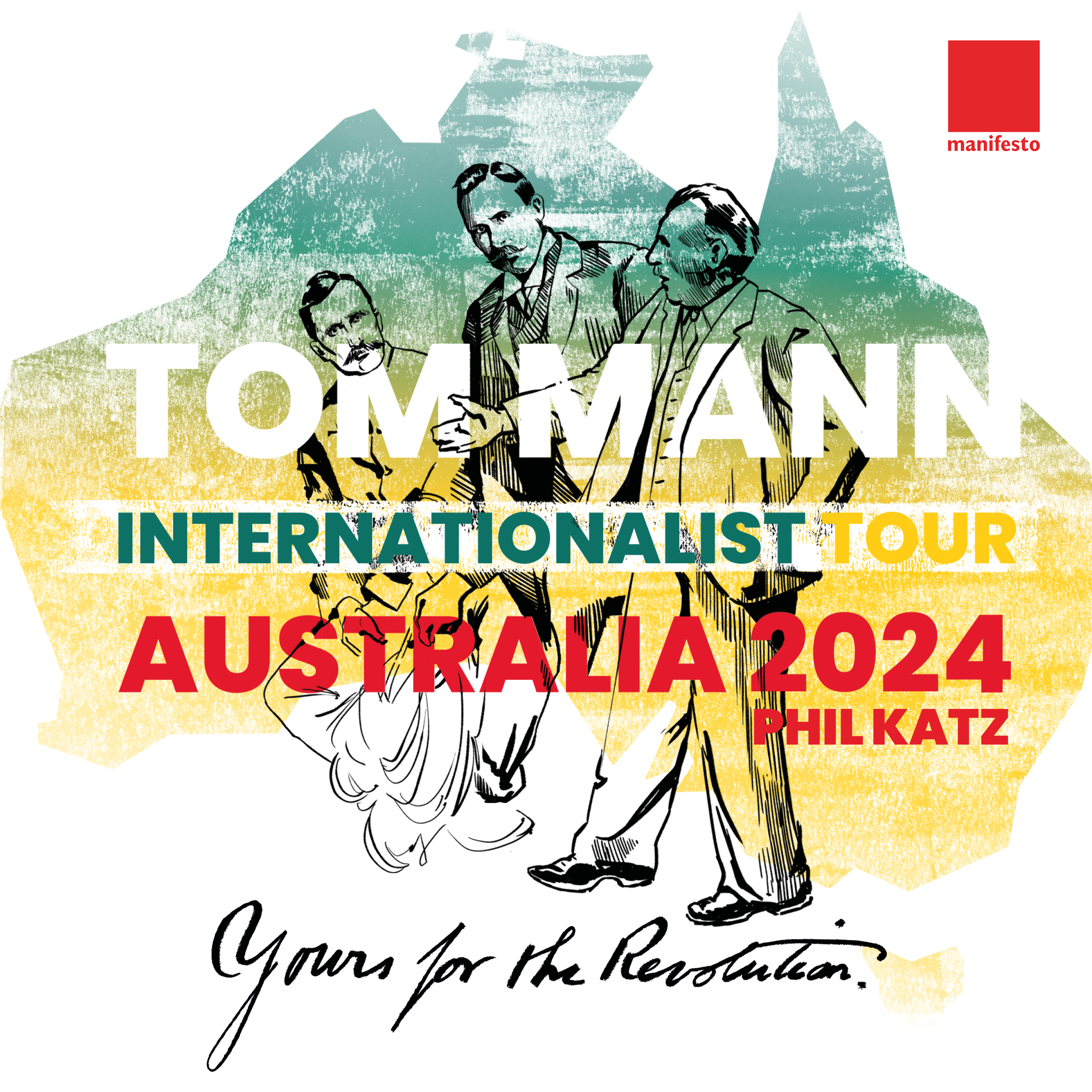
PHIL KATZ, author Yours for the revolution: The evolution of Tom Mann's political thought, embarks on speaking tour of Australia March-April 2024
USE CODE 'INT2024' FOR 20% OFF YOUR ENTIRE ORDER WHEN ORDERING 'YOURS FOR THE REVOLUTION'
__________________
It was inevitable that, at some point in his extraordinary life’s journey, Tom Mann would turn up on the shores of Australia and New Zealand.
He loved both countries and settled in Australia for some of his best years and sought to return there on retirement. But the British colonial administration and Australian government barred him from ever landing again.
Mann was a craftsman engineer and the greatest union leader to date, acknowledged around the globe as a founding father and influence - in China, Britain, Australia, South Africa, Canada and the USA, the Soviet Union and especially on continental Europe. He had first hand experience of all of these countries leaving a legacy and a strengthened labour movement. 
Mann was first sent to work in a coal mine in ‘near medieval conditions’ and made the intellectual transition from his roots in Swedenborg Christianity, to trade unionism, cooperation, social democracy, syndicalism and finally for his last twenty years, to Marxism.
His brand of trade unionism was combative, linked to history and core values of collectivism, forged over centuries. When he addressed the striking miners of Broken Hill he called-up the spirit of John Ball and the peasants rising, which had occurred seven centuries before on the other side of the world. But the miner’s identified with the sense of purpose and sense of values that Mann invoked. His every public speech called for unity, organisation and internationalism.
Mann was influenced by the story of the Tolpuddle Martyrs, cruelly exiled to Australia but returned to Britain as a result of mass public agitation. Australia was amongst his most intense learning years and he left a real mark on its industrial and political culture. When he died in 1941, the Red Flag was flown half mast over civic buildings in Victoria.
Mann was a leader of the Great British Dock Strike of 1889 which triumphed, in good measure, because of huge financial solidarity sent from Australia, a gift returned when Australian port workers struck a year later. He pioneered the Free Speech fights in London’s East End and did the same, decades later in Prahran, Melbourne, which earned him a spell behind bars. And as the dark clouds of fascism passed over Europe, Australian volunteers for liberty, fought in the Tom Mann Centuria of the British Battalion on the fields of Spain.
In his lifetime he led strikes that were to change the industrial landscape around the world and is particularly associated with the struggle for an 8-hour day - 8 hours work, 8 hours rest and 8 hour restitution for the enhancement of life, family, community and class.
He led the Great Dock Strike 1889, Miners Strike 1910, Merseyside port and transport general strike 1911, when he was branded, ‘the dictator of Merseyside’. He led the miners strike at Broken Hill in New South Wales, general strikes in South Africa in 1912 and again in 1922 when strike leaders were hung and nine deported to Britain He organised solidarity for the Dublin lock-out 1913, led the Engineers when locked out in 1922, was key to preparations for the General Strike 1926, and led general strikes of port workers and peasants in Hong Kong and Shanghai in 1927. He is associated with the great Hunger Marches of the 20s and 30s.
Mann counted as acquaintances, close friends and allies the likes of James Connolly, Mary McArthur, Keir Hardie, Lenin, Trosky, William Morris, Harry Pollitt, Sen Katayama, Big Bill Haywood, Solomon Lozovsky, Soviet President Mikhail Kalinin, Gustav Herve, Ben Tillet, William Z Foster, George Hardy, the Countess of Warwick and Willie Gallacher.
To him the class struggle was a means to abolishing poverty. He did not differentiate between reform and revolution. He was a class war warrior who was much loved, but regularly fell foul of the law. He was twice put on trial for sedition in Australia. In 1912 sensationally, Mann was imprisoned for calling on troops to refuse to fire on strikers. In 1932 he was charged under a law dating back to 1300 and imprisoned at the age of 76, but would not recant. He was variously barred entry to or deported from Spain, Sweden, Germany, America, Canada, South Africa, New South Wales in Australia and worked as a clandestine organiser, aged 72 for six months in Wuhan in China.
Phil Katz’s book encapsulates something of Mann’s life, his adventures and many achievements. But it focuses on the ideas that drove Mann. Already the subject of a speaking tour that has criss-crossed Britain, Katz now brings the challenge of Tom Mann back to Australia, a country that did as much as any other than Britain, to forge Mann’s political vision.
